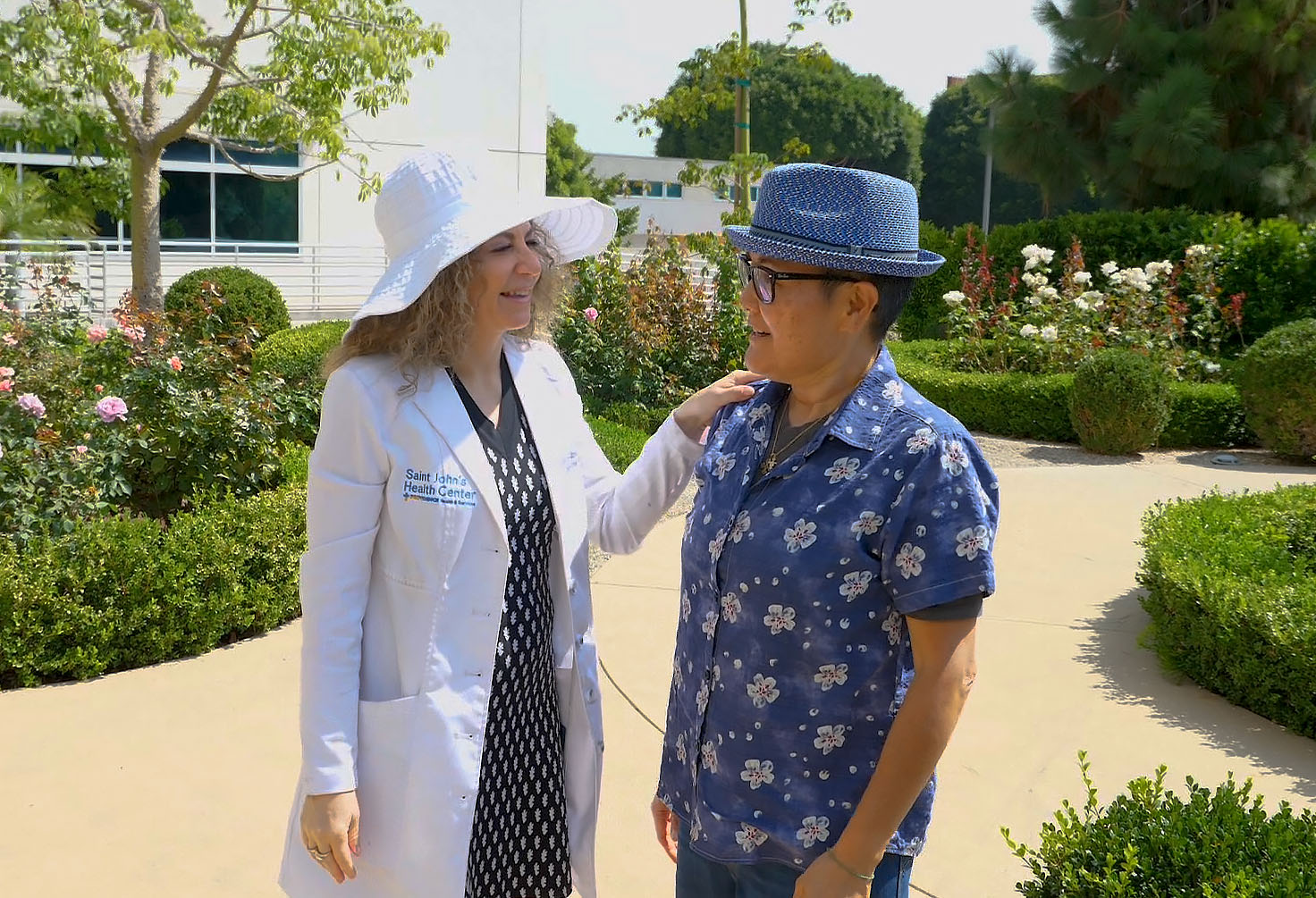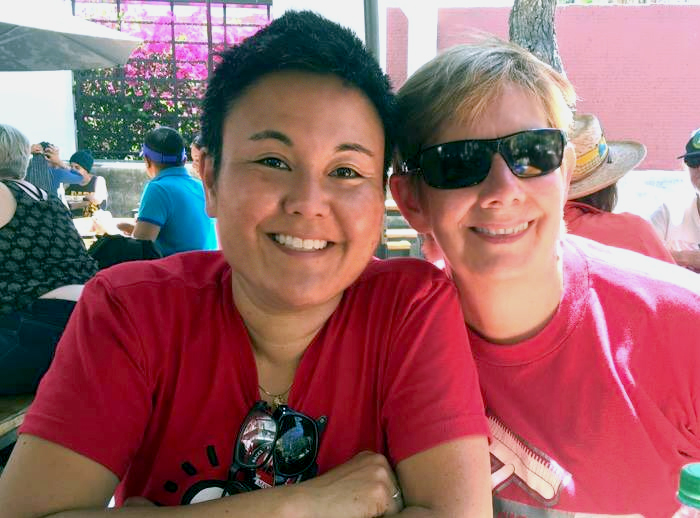
Lee Ann Found Trust in Dr. Melanie Goldfarb Before She Discovered She Had Hurthle Cell Carcinoma
Diagnosed in September 2022 with a stage 1 Hurthle cell thyroid carcinoma, a rare and more aggressive form of thyroid cancer, Lee Ann Goya decided to remove her entire thyroid despite her personal feelings towards Western medicine. Lee Ann’s unwillingness to surgically remove her thyroid stemmed from her ill regard towards Western medicine. “I get a little suspicious with Western medicine because it’s my thinking that sometimes they want to take out the thing that is not working and not have preventative care.” What changed her mind then? She found trust in Dr. Melanie Goldfarb, her surgical oncologist, and the Saint John’s medical staff.
Dr. Goldfarb, she didn’t just come straight out and say she was going to take it out, she listened to me and my concerns. That’s what I like. When a doctor listens to me and my needs and my concerns. She was there for me. It was my first time going under. I had fears of dying. I felt with Dr. Goldfarb… it felt like I was being held.
– Lee Ann Goya
Because Lee Ann has an aggressive thyroid cancer that is more likely to metastasize to other body parts, she was prescribed a higher dose of hormone medication to suppress Hurthle cell growth. That being the case, Lee Ann is currently considered one year cancer free.
How to Treat Hurthle Cell Carcinoma?
Interestingly, even though Lee Ann has an aggressive cancer, differentiated thyroid carcinomas are highly treatable and have one of the best survival rates.1
Initially, Dr. Goldfarb removed the right half Lee Ann’s thyroid because Lee Ann still wanted to keep part of her thyroid. “At first, I wanted to try a less invasive approach to surgery,” and Dr. Goldfarb said she would try another approach called radiofrequency ablation (RFA). However, RFA is typically a treatment for benign thyroid nodules and in a very specific instance, cancer. Surgery was Lee Ann’s only option after her biopsy came back positive for cancer.
One week later, Dr. Goldfarb removed the left side of Lee Ann’s thyroid after pathology identified she had a more aggressive thyroid cancer which could recur if left in Lee Ann’s body. In addition, a thyroidectomy is the mainstay of treatment of Hurthle cell tumors.
I felt bad saying I had no symptoms or side effects. Even having my thyroid out, there were no complications there.
– Lee Ann Goya

Lee Ann’s only symptom was a 4-centimeter tumor protruding from her neck. She explained jokingly she would have kept her nodule too. She didn’t care others could see it; she didn’t have to.
Lee Ann received adjuvant Radioactive Iodine (RAI), which is commonly used for high-risk features such as tumors sizes greater than 2 centimeters, cervical lymph nodes metastasis, or positive margins in Hurthle cell carcinomas.1
I’m glad I made the decision and I’m glad that I trusted her.
– Lee Ann Goya
Listen to Lee Ann Goya Overcome Her Fear of Surgery
Lee Ann Goya speaks with SJCI staff at Saint John’s Health Center alongside Dr. Goldfarb.
Hurthle Cell Thyroid Carcinoma Facts
- A rare aggressive form of thyroid cancer with a high rate of metastasis which may spread to the lungs, lymph nodes, bones, and infrequently the brain.
- Hurthle cells have somatic mutations in their mitochondria DNA.
- Used to be considered a variant of follicular thyroid carcinoma (the most common type of thyroid cancer) and now is defined as a follicular thyroid cell “derived” cancer.
- Presents more in women and people assigned female at birth (AFAB)
- Typically diagnosed after 40 years of age
- Represents in about 5 percent of all differentiated thyroid cancers.
- Hurthle cell is a cell in the thyroid gland that can be associate with Hashimoto’s disease.
Advice from Lee Ann to others:
- Go in there with an open mind.
- Listen to what the doctor has to say.
- Look at the options, do your research, and challenge the doctor: go in with your own questions and worries. Sometimes you need challenge the doctor, and if they’re good, they won’t take offense and they’ll go with it.
- It was important that I really trust Dr. Goldfarb. I am very grateful to have someone that knew what they were doing. I would have never known. It was sort of a silent thing.
I’m living a normal life.
– Lee Ann Goya
To Dr. Goldfarb and Providence, Saint John’s Health Center’s staff:
Thank you for taking care of me, being attentive, for checking in with me, giving me call backs—that kind of care makes a patient be seen and heard. I appreciate what you do and saving other people’s lives out there. I feel like this whole experience was a gift. Maybe I feel a little bit better about western medicine, ok, we can work together. Maybe when I see you again, I bring another box of cream puffs!
Lee Ann’s Care Team!
Dr. Melanie Goldfarb – Professor of Surgery at Saint John’s Cancer Institute. Dr. Goldfarb oversaw Lee Ann’s treatment plan and surgery. Dr. Goldfarb is the Director for Cancer Survivorship at Saint John’s Health Center. She is the Director of the Center for Endocrine Tumors and Disorders.
Dr. Sarah Rettinger – Endocrinologist at Saint John’s Health Center. Dr. Rettinger oversees Lee Ann’s medication dosage. Lee Ann will visit Dr. Rettinger for any changes in medication, and to make sure she remains on the path to a happy healthy lifestyle. Dr. Rettinger and Dr. Goldfarb work closely together on individual cases.

